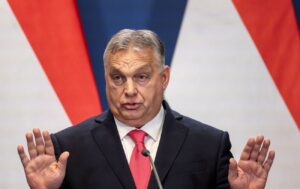
Hungarian Prime Minister Viktor Orbán announced that his government will not comply with the EU Migration and Asylum Pact and does not intend to accept migrants under relocation schemes. “As long as there is a patriotic government in Hungary, we will not implement the migration pact. We will not accept migrants and will not spend a cent on them,” Orbán wrote on Twitter on Wednesday.
The statement came amid the European Commission’s initiative to relocate asylum seekers from the countries under the most pressure — Spain, Italy, Greece, and Cyprus — to other EU states.
A number of countries, including Hungary, Poland, and Slovakia, have opposed participation in this scheme.
Orbán has repeatedly criticized pan-European mechanisms for distributing migrants and threatened to sue the European Commission if mandatory resettlement quotas are imposed.
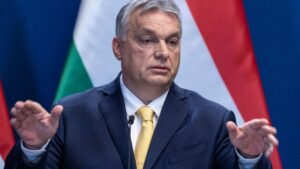
Hungarian Prime Minister Viktor Orbán has said he is ready to host a meeting between US President Donald Trump and Vladimir Putin in Budapest, Hungary.
“The planned meeting between the US and Russian presidents is great news for peace-loving people around the world. We are ready!” Orbán wrote on social media on Thursday.
As reported, Trump spoke with Vladimir Putin on Thursday, calling it a very productive conversation, and announced the planned meetings—a personal meeting in Budapest and a meeting between advisers beforehand. He also said that during a planned meeting on Friday with Ukrainian President Volodymyr Zelensky in the Oval Office, the parties will discuss this conversation with Putin “and much more.”
At the same time, Trump said that during the conversation with Putin, he devoted a lot of time to discussing “trade between Russia and the US after the end of the war with Ukraine.”
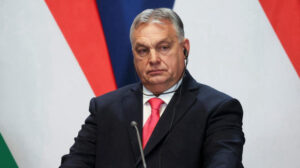
On his Facebook page, Hungarian Prime Minister Viktor Orban wrote 12 points of expectations of the Hungarian people from Brussels, including “the union, but without Ukraine.” Here are the points listed in the post:
– we want a Europe of nations;
– We want equality before the law for all member states;
– return to the member states the illegally taken away powers;
– national sovereignty, strong veto power for national governments;
– exclude Soros agents from the European Commission and corrupt lobbyists from the European Parliament;
– the future of our grandchildren should not be mortgaged;
– not to prevent our National Guard from defending our borders. Do not accept migrants, take away illegal immigrants from us;
– “corrupt” dollars and euros should not enter EU member states;
– prohibit the “unnatural” re-education of our children;
– we want to protect the Christian heritage of Europe;
– demand peace in Europe;
– Union, but without Ukraine.

Europe will need to rethink its support of Ukraine if Donald Trump is elected president of the United States, Hungarian Prime Minister Viktor Orban said on Sunday, as the continent “will not be able to bear the burdens of the war alone”.
Orban opposes military aid to Ukraine and has made clear he thinks Trump shares his views and would negotiate a peace settlement for Ukraine.
He backs former president Trump, the Republic candidate, to beat Democratic candidate Kamala Harris in Tuesday’s U.S. election.
“We (in Europe) need to realize that if there will be a pro-peace president in America, which I not only believe in but I also read the numbers that way, … if what we expect happens and America becomes pro-peace, then Europe cannot remain pro-war,” Orban said.
Ukraine will be high on the agenda when European leaders meet in Budapest in the coming week, he said, referring to a European Political Community meeting and a more informal meeting of EU leaders due to take place.
“Europe cannot bear the burden of [the war] alone, and if Americans switch to peace, then we also need to adapt, and this is what we will discuss in Budapest,” Orban said.
Europe is jittery about how the outcome of the U.S. election will affect the war in Ukraine and the continent’s security.
Orban has angered Brussels with his close ties to Russia and opposition to aid for Ukraine.
Hungary’s foreign minister Peter Szijjarto said in July that the Hungarian government sees Trump as a “chance for peace” in Ukraine.
In July Orban said his team was assisting Trump’s aides with policies on families and migration. On Thursday, he called Trump to wish him good luck ahead of Tuesday’s election.
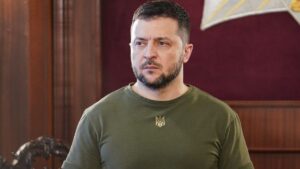
Ukrainian president condemns Hungarian prime minister’s unilateral ‘peace mission’ to Moscow
Volodymyr Zelenskiy has taken aim at the Hungarian prime minister, Viktor Orbán, accusing him of betraying fellow European leaders after Orbán’s recent “peace mission” to Moscow.
The Ukrainian president kicked off the European Political Community summit at Blenheim Palace on Thursday with an emotional speech in which he made veiled but repeated references to Orbán’s recent attempts to get close to Moscow.
Zelenskiy was addressing a room packed full of European leaders and defence ministers, who have gathered in Oxfordshire at a pivotal moment for the war in Ukraine.
He told the session: “We have maintained unity in Europe by acting together, which means that Putin has missed his primary targets … This is our advantage, but it remains an advantage only as long as we are united.”
Referring to Putin, he said: “He may try to approach you, or go to some of your partners individually, trying to tempt or pressure you to blackmail you so that one of you betrays the rest. We keep our unity.”
In an apparent reference to Orbán’s recent visit to meet Putin in Moscow, he added: “If someone in Europe tries to resolve issues behind our backs, or even at the expense of someone else, if someone wants to make some trips to the capital of war to talk – and perhaps promise something against our common interests or at the expense of Ukraine or other countries – then why should we consider such a person?
“The EU can also address all their issues without this one individual.”
Orbán has regularly been a thorn in the side of European leaders attempting to maintain unity in their support for Ukraine. Earlier this year he blocked a €50bn (£42bn) support package for Kyiv for more than a month while he negotiated additional conditions.
This month, the Hungarian leader travelled to Moscow for what he called a “peace mission”, holding a joint press conference with Putin in which the Russian leader told Kyiv to give up more land, pull back its troops and drop its efforts to join Nato.
Orbán then held talks with the former US president Donald Trump, after which he wrote to European leaders telling them Trump had “well-founded plans” for peace should he return to the White House after November’s presidential election. Trump has since underlined his desire to back out of foreign conflicts by choosing the isolationist JD Vance as his running mate.
Orbán’s actions on the world stage have caused alarm in European capitals, with Zelenskiy’s invitation to Blenheim Palace designed in part as a show of unified support for Ukraine.
Hours before the Ukrainian president spoke, Ursula von der Leyen issued a similar message in a speech to MEPs. The president of the European Commission said: “Two weeks ago, a European prime minister went to Moscow. This peace mission was nothing but an appeasement mission.”
Keir Starmer, the British prime minister, made a strong statement of support as he introduced Zelenskiy on Thursday. “Every day Ukraine fights to protect not just the Ukrainian people, but the European people – a continent where our belief in freedom, democracy and the rule of law was hard won, that wants to live in peace,” he said.
“President Zelenskiy, in your struggle to uphold those values, we salute you. Once again, have no doubt, we will stand with you for as long as it takes.”
Zelenskiy also used his speech to European leaders to urge them to provide air defences for Ukraine and not to place limits on their use. The UK has provided Ukraine with Storm Shadow missiles, but is not allowing Zelenskiy to use them against Russian territory.
“We should not fear these capabilities,” the Ukrainian president said. “The more effective our air defences, the more helpless Putin will be. The fewer restrictions we have on the use of effective weapons, the more Russia will seek peace.”
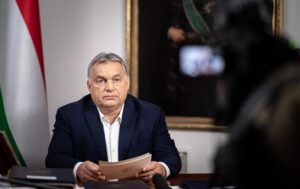
Hungarian Prime Minister Viktor Orban has threatened to block all EU aid to Ukraine, as well as the country’s future accession to the bloc, unless EU leaders agree to review their entire strategy for supporting Kyiv, according to a letter to European Council President Charles Michel, Politico reports.
In the letter, Orban said that no decisions on funding Ukraine, opening EU accession talks or further sanctions against Russia can be made until a “strategic discussion” takes place when leaders gather in Brussels in mid-December.
“The European Council should analyze the implementation and effectiveness of our current policy towards Ukraine, including the various assistance programs,” Orban wrote in the letter, which is undated but bears the stamp of his office.
He also questioned why Europe should continue to support Ukraine at a time when the United States, which has provided the bulk of military aid to Kyiv, may not be able to continue funding due to a party deadlock over further support.
“The European Council should have a frank and open discussion about the feasibility of the EU’s strategic goals in Ukraine. Do we think these goals are realistically achievable? Is this strategy sustainable without reliable support from the U.S.? Can we take continued U.S. support for granted? How do we envision the security architecture of Europe after the war,” the letter emphasizes.
Orban also added that “the European Council is not in a position to take key decisions on the proposed security guarantees or additional financial support for Ukraine, to approve further strengthening of the EU sanctions regime or to agree on the future of the enlargement process until a consensus is found on our future strategy towards Ukraine.”
As the newspaper notes, Orban’s letter raises the stakes in the ongoing standoff between Budapest and Brussels, which is withholding EUR13 billion in EU funds from Hungary over concerns that the country is violating EU standards in the area of the rule of law.
Without explicitly stating this, the letter suggests that Budapest may use its veto power to block the disbursement of planned EUR50 billion in aid to Ukraine – funds needed to finance the Ukrainian government while its armed forces fight a full-scale Russian invasion.
In addition to the EUR50 billion, Orban threatens to block the planned EUR500 million in military aid to Ukraine, as well as the start of formal negotiations on Kyiv’s accession to the 27-member union, which the leaders had hoped to approve at the next European Council meeting on December 14 and 15.
According to one EU diplomat, who was granted anonymity to discuss the confidential discussions, Orban “mined” the entire decision-making process on Ukraine as part of a strategy to pressure the European Commission to allocate EUR13 billion to Hungary. The diplomat noted that while in other cases Budapest abstained from voting on key issues and allowed the EU to impose sanctions on Russia, in this case “I don’t see this happening.”
“For Hungary, this is not a matter of neutrality. It is about leverage,” the diplomat said.